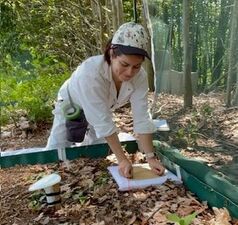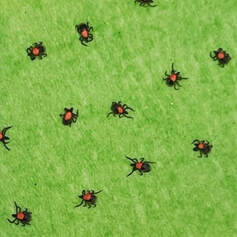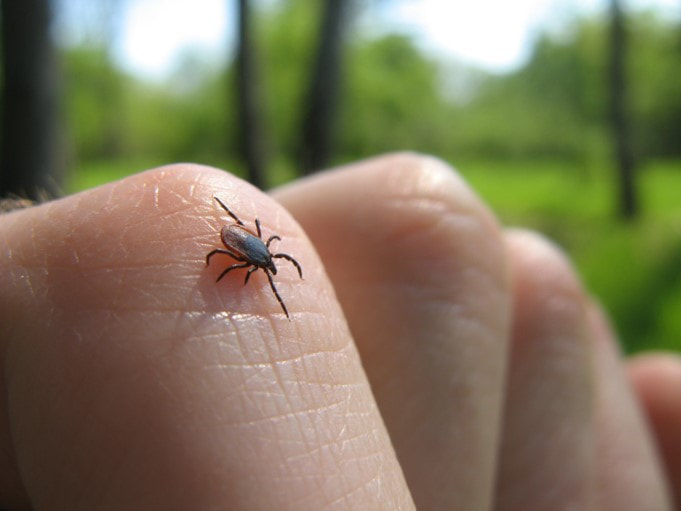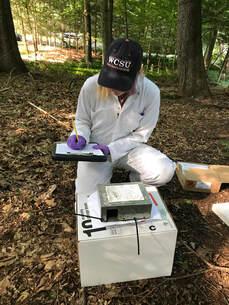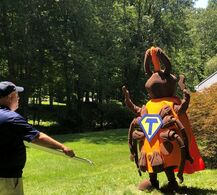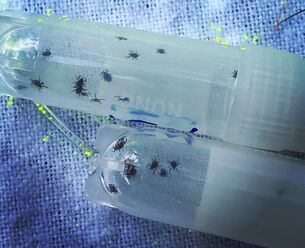Tick Lab Research Projects
Our Research Focus:
Lyme disease is a serious tickborne illness of humans that is endemic to the northeastern United States. The tick species that transmits Lyme-causing bacteria can also transmit a variety of other debilitating pathogenic agents, thereby constituting a major public health concern. Our research focuses primarily upon preventing Lyme disease and other tick-borne infections in Connecticut and throughout the northeastern United States. Specifically, we are interested in how individuals and communities can protect themselves from tickborne illnesses, either via personal behaviors or by manipulating the environment. Our focus is primarily upon blacklegged ticks, and we also monitor tick populations at multiple locations to identify and track emerging tick species.
Collaborators and Funding:
Many WCSU Tick Lab studies are conducted in cooperation with (and with funding from) the Centers for Disease Control and Prevention, including research conducted as part of the New England Center of Excellence in Vector-borne Diseases (NEWVEC) and TickNET Emerging Infections Program. NEWVEC is a collaboration with the University of Massachusetts Amherst, with partners at University of Rhode Island, Northern Vermont University, the University of New Hampshire, Dartmouth College, and the University of Maine. TickNET collaborators include the CDC Division of Vector-Borne and Zoonotic Diseases (DVBD), the CT Department of Public Health , the Emerging Infections Program at Yale School of Public Health, and several state public health agencies in MD, MN, and NY. We also work with the TickEncounter Resource Center at the University of Rhode Island, partners at Western Connecticut Health Network, and Ridgefield Health Department’s BLAST Program and Lyme Connection. Additional projects have been made possible by the Environmental Protection Agency and also with the help of CSU-AAUP Faculty Research Grants as well as some regional private and community partners.
Lyme disease is a serious tickborne illness of humans that is endemic to the northeastern United States. The tick species that transmits Lyme-causing bacteria can also transmit a variety of other debilitating pathogenic agents, thereby constituting a major public health concern. Our research focuses primarily upon preventing Lyme disease and other tick-borne infections in Connecticut and throughout the northeastern United States. Specifically, we are interested in how individuals and communities can protect themselves from tickborne illnesses, either via personal behaviors or by manipulating the environment. Our focus is primarily upon blacklegged ticks, and we also monitor tick populations at multiple locations to identify and track emerging tick species.
Collaborators and Funding:
Many WCSU Tick Lab studies are conducted in cooperation with (and with funding from) the Centers for Disease Control and Prevention, including research conducted as part of the New England Center of Excellence in Vector-borne Diseases (NEWVEC) and TickNET Emerging Infections Program. NEWVEC is a collaboration with the University of Massachusetts Amherst, with partners at University of Rhode Island, Northern Vermont University, the University of New Hampshire, Dartmouth College, and the University of Maine. TickNET collaborators include the CDC Division of Vector-Borne and Zoonotic Diseases (DVBD), the CT Department of Public Health , the Emerging Infections Program at Yale School of Public Health, and several state public health agencies in MD, MN, and NY. We also work with the TickEncounter Resource Center at the University of Rhode Island, partners at Western Connecticut Health Network, and Ridgefield Health Department’s BLAST Program and Lyme Connection. Additional projects have been made possible by the Environmental Protection Agency and also with the help of CSU-AAUP Faculty Research Grants as well as some regional private and community partners.
|
New England Center for Excellence
in Vector-borne Diseases (NEWVEC) Collaboration In collaboration with NEWVEC, the WCSU Tickborne Disease Prevention Laboratory is responding to the current challenges of vectorborne disease prevention.
Tick Garden Studies We will evaluate the efficacy of landscape interventions, including acaricidal treatment and vegetative management, in reducing tick encounter risk on residential properties. During the spring and summer 2023, graduate student Sandra Zapata (M.S., Integrative Biological Diversity, '25) tested various release-recapture methods for nymphal blacklegged ticks in multiple enclosure systems that model the peridomestic environment, particularly the lawn-forest interface. In 2024, vegetation management techniques will be tested for efficacy employing methods selected from the release-recapture and enclosure pilot studies in 2023. Recommended to homeowners in the Northeast to reduce tick exposure risk, vegetation management techniques have not been widely studied or supported with evidence-based research. Project ITCH In 2024 the WCSU Tick Lab will participate in Project ITCH, in collaboration with NEWVEC and its partners. This project investigates homeowner tick management techniques in the Northeast and will measure the effectiveness of these treatments. |
|
Backyard Behavior Tick Study
We are conducting a survey to better understand the relationship between people's outdoor activities and risk of a tick encounter or tick bite. The WCSU Tickborne Disease Lab is conducting this study as a TickNET collaborator with the CT Emerging Infections Program. TickNET is a collaboration between CDC, public health agencies, and academic researchers, aimed at public health surveillance, research, education, and prevention of tickborne diseases. Learn more about CDC TickNET.
About the project: The survey will gather information about outdoor activities in which people engaged before finding a tick upon themselves. Survey respondents will be Connecticut residents submitting ticks for testing and identification with local health departments. The survey responses and tick identification data will allow us to determine which outdoor activities and locations may pose greater risk of tick encounters. The results will allow researchers to improve Lyme disease prevention guidance.
|
|
Deer Fence Tick Suppression Study
About the project: An evaluation of the impact of deer fence on abundance of blacklegged adults and nymphs by comparing 1/2 to 6 acre residential properties with deer fence (treatments) to properties without deer fence (controls) in southwestern Connecticut, Westchester County, NY, and Rhode Island. We are collaborating with the University of Rhode Island TickEncounter Resource Center and funded by the Centers for Disease Control (CDC).
Related references: Connally, N.P., A.J. Durante, K.M. Yousey-Hindes, J.I. Meek, R.S. Nelson, and R. Heimer. 2009. Peridomestic Lyme disease prevention: results of a population-based case-control study. American Journal of Preventive Medicine 37: 201-206. |
|
About the project: A placebo-controlled evaluation of an integrated tick management (ITM) approach at single vs. contiguous properties treated with both targeted acaricidal spray and rodent-targeted bait boxes. We are collaborating with the University of Rhode Island TickEncounter Resource Center on this study that is taking place in communities located in western CT and southern RI. Project website: www.backyardtickstudy.org Related reference: NP Connally, Mather, TN, Ginsberg, HS, Krell, RK, Engborg, S, Hojgaard, A, Eisen, L, and Hinckley, A. The backyard integrated tick management study: understanding peridomestic risk and prevention of tickborne diseases. The 15th International Conference on Lyme Borreliosis and Other Tickborne Diseases, Atlanta, GA, September 2018, and The 48th Annual Conference of the Society for Vector Ecology, Yosemite, CA, October 2018. |
|
About the project: An educational initiative to promote safe and judicious pesticide use by families for backyard tick control. Funded by an EPA Healthy Communities Grant, this project is being conducted in collaboration with our long time community partner, the Town of Ridgefield’s BLAST Tickborne Diseases Prevention Program.
Project website: www.spraysafeplaysafe.org Related reference: Hornbostel, V.L., R.K. Krell, J. Reid, S. Volpe, B.L. Schappach, and N.P. Connally. 2020. Spray Spray safe, play safe: story-based films increase homeowner confidence about backyard tick management. Journal of Medical Entomology. doi:10.1093/jme/tjaa230 |
|
TickNET Lyme and other Tickborne Disease
Prevention Studies We are excited to partner with the CT Emerging Infections Program as a TickNET collaborator. TickNET is a collaboration between CDC, public health agencies, and academic researchers, aimed at public health surveillance, research, education, and prevention of tickborne diseases. Learn more about CDC TickNET.
|
Recent TickNET projects at WCSU have included:
- 4-Poster feasibility study — A pilot project to evaluate feasibility for using deer-targeted tick control devices (4-posters) for community-level tickborne disease prevention.
- Tick Exposure Field Study — A field study to characterize risk for exposure to blacklegged ticks based on human activity and location.
- Permethrin-Treated Clothing Study — A laboratory evaluation of permethrin-impregnated clothing for repelling blacklegged ticks.
- Bait Box Intervention — A prospective, blinded, placebo-controlled trial at 650 residential properties in CT to evaluate the efficacy of commercially available, rodent-targeted bait boxes to prevent Lyme and other tickborne diseases in humans.
- Lyme and Other Tickborne Diseases Prevention Study — A prospective, blinded, placebo-controlled trial of 2700 households in CT, MD, and NY, to evaluate the efficacy of a single springtime application of commercially available, EPA-registered acaricide (bifenthrin) to prevent Lyme and other tickborne diseases in humans.
- Lyme and other Tickborne Disease Diagnostic Testing Laboratory Survey
Related references:
- Connally, NP, Rose D, Bruener, N, Prose, R, Fleshman, Thompson, K, Eisen, L. 2018. Impact of
wearing and washing summer-weight permethrin-treated clothing articles on their contact irritancy and toxicity for nymphal Ixodes scapularis (Acari: Ixodidae) ticks. Journal of Medical Entomology. 56:199-214.Connally NP, Hinckley AF, Feldman KA, Kemperman MM, Neitzel D, Wee SB, White JL, Mead PS, Meek JI. Testing practices and volume of non-Lyme tickborne diseases in the United States. Ticks Tick Borne Dis. 2016 Feb;7(1):193-8. - Eisen L., Rose D, Prose R, Bruener N, Dolan M, Thompson K, Connally NP. Bioassays to evaluate non-contact spatial repellency, contact irritancy, and acute toxicity of permethrin-treated clothing against nymphal Ixodes scapularis ticks. Ticks and Tick-Borne Diseases. http://dx.doi.org/10.1016/j.ttbdis.2017.06.010.
- Feldman KA, Connally NP, Hojgaard A, Jones EH, White JL, Hinckley AF. Abundance and infection rates of Ixodes scapularis nymphs collected from residential properties in Lyme disease-endemic areas of Connecticut, Maryland, and New York.external icon J Vector Ecol. 2015 Jun;40(1):198-201.
- Jones EH, Hinckley AF, Hook SA, Meek JI, Backenson B, Kugeler KJ, Feldman KA. Pet ownership increases human risk of encountering. Zoonoses Public Health. 2018; 65: 74–79.
- Hinckley AF, Connally NP, Meek JI, Johnson BJ, Kemperman MM, Feldman KA, White JL, Mead PS. Lyme Disease Testing by Large Commercial Laboratories in the United States.external icon Clin Infect Dis. 2014 Sep 1;59(5):676-81.
- Hinckley AF, Meek JI, Ray JAE, Niesobecki SA, Connally NP, Feldman KA, Jones EH, Backenson PB, White JL, Lukacik G, Kay AB, Miranda WP, Mead PS. Effectiveness of residential acaricides to prevent Lyme and other tickborne diseases in humans.external icon J Infect Dis. 2016 Jul 15;214(2):182-8.
|
Tick Monitoring
We have been conducting weekly monitoring of tick populations at multiple Fairfield County, CT locations since 2011. Our monitoring activities led to the detection of the first documented exotic Asian longhorned tick (Haemaphysalis longicornis) in the state of Connecticut in 2018. Asian longhorned ticks are important livestock pests that have also been shown to transmit pathogens to humans in Asia. |

